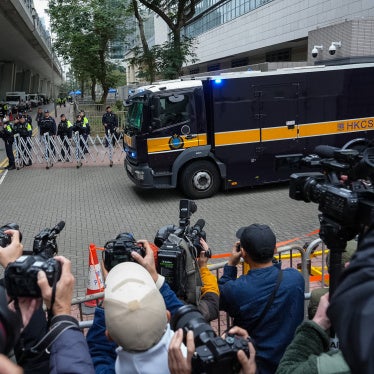(New York) Abdurrahman Wahid, Indonesia's president, has embarked on a dangerous course in declaring a not-quite-state of emergency today, Human Rights Watch said.
Early Monday morning, Jakarta time, the president issued a decree "freezing" the two houses of parliament, calling for an election within one year, and freezing the former ruling party, Golkar while waiting for a decision from the Supreme Court on the matter. No special powers were granted to the security forces, a usual feature of states of emergency, and the word "emergency" appears nowhere in the decree.
President Wahid has, however, moved Indonesia into uncharted legal territory. There is no legal definition of "freezing" - it seems to be something short of dissolution - and little constitutional guidance on what steps the president can take against parliament. The 1945 constitution makes the president subordinate to the People's Consultative Assembly, the upper house of parliament, that appoints him, and many constitutional scholars believe he has no powers to dissolve either the upper or the lower house.
The president, in issuing this decree, risks contravening two key provisions of the Universal Declaration of Human Rights. By unilaterally "freezing" Golkar, a legitimate political party whatever its links to the authoritarian past, President Wahid is violating the fundamental right to freedom of association. By moving against a parliament freely elected in 1999, the president may be violating the right of everyone to take part in the government of his or her country.
"Whatever the motivation for these actions, the content of today's decree is chilling," said Sidney Jones, Asia director of Human Rights Watch. "The answer to political impasse should not be a return to authoritarian methods."
She noted that many civil society organizations were backing Wahid and appeared with him at the presidential palace when he made his early morning statement. They see him as a better alternative than his army-backed vice-president, Megawati Sukarnoputri, who would take over if Wahid were forced out. They see Wahid's political enemies in parliament as being too close to the former Soeharto administration. And they believe that it should be the Indonesian people who decide the fate of their president.
Wahid's actions could set up a confrontation between the army and the president, in which the president would have few backers, or between the army and thousands of protestors in the street, if Wahid supporters go for mass mobilization in a last-ditch effort to keep him in power.
"Either way, the army could emerge strengthened," said Jones. "The spectacularly poor performance of civilian politicians, legislators and president alike, is producing the very result that everyone wanted to avoid."
The political crisis in Indonesia has its roots in a power struggle between the parliament and the president. The upper house of parliament chose Abdurrahman Wahid as a compromise for president in October 1999, despite the fact that his party had secured less than ten percent of the vote in the June 1999 elections. Wahid proceeded to alienate his backers by failing to distribute cabinet posts as expected and by failing to consult with parliamentary leaders on policy.
In January 2001, the parliament moved to censure him for involvement in two financial scandals, but the Attorney General's office later ruled that there was no legal basis for charging the president. The parliament continued with its censure procedures, however, on different grounds. The president is correct in questioning the dubious constitutional basis of the parliament's actions, but the president's own actions are on shaky legal ground. Indonesia has no provision in its constitution for the Supreme Court resolving disputes over interpretation by other branches of government.







